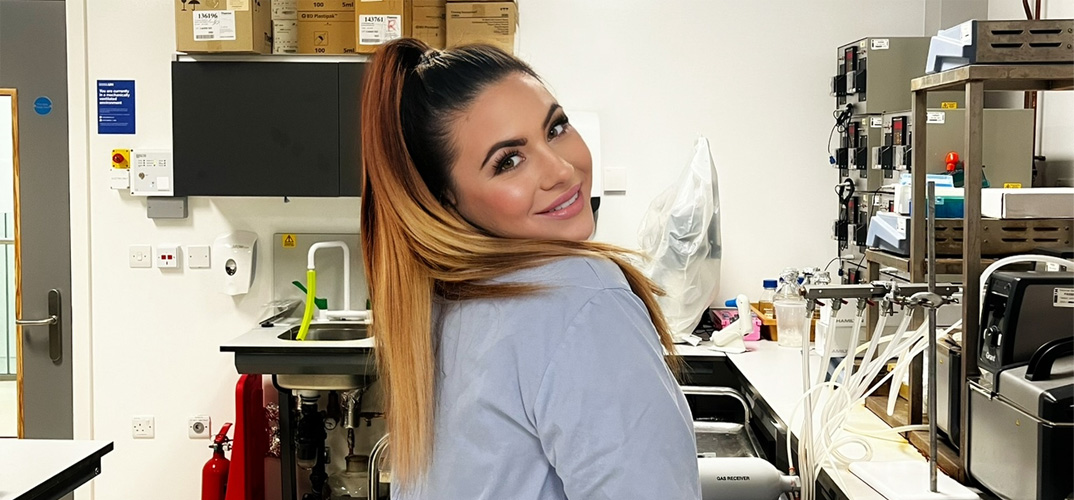“I want young women to know their science dreams are possible”: Herts biologist influencer on cancer research, chronic illness and being a woman working in STEM

At age 16, Ellie Hurer was diagnosed with salivary gland tumours. Resultant major operations and treatments would leave her lips and tongue partially paralysed, while severe nerve pain, and medication like morphine, would make day-to-day life difficult.
But 12 years later, Ellie is a PhD student and visiting lecturer at the University of Hertfordshire, labouring away in the lab on potentially lifesaving cancer research. On top of lab work, she is a professional social media influencer, a BBC Bitesize presenter and a NATO youth ambassador.
Ellie wants to challenge perceptions of chronic illness and help encourage young women to take their first steps into STEM careers, no matter what challenges are thrown their way. Since 2019, she has documented her journey through academia and her Instagram account, @myphdexperience, now commands an audience of over 75,000 people. She even went viral in 2021, when her dog proceeded to vomit while she was speaking on a Zoom call to over 30,000 people, including scientists, inventors and Nobel laureates.
Ahead of the International Day of Women in Girls in Science 2024, on 11 February, Ellie told us about her experiences and how she has used her social media as a way of reaching out to people in a similar position.
“I wanted my account to be the resource I needed when I was starting out,” she said. “It’s a journey of my life, but it’s also there to inspire people. I use it to advocate for better representation in science, particularly in terms of gender, mental illness and disability. I try and make it a safe space for people to talk about things and to let people know that they’re not alone.”
Ellie researches potential treatments for pancreatic cancer, identifying a protein which starts a process of cell growth. But lab work can be hard when having to deal with the day-to-day realities of living with a chronic illness. She has had a total of 13 major surgeries, including three salivary gland removals and neck dissections, internal radiotherapy, alcohol ablation, Botox treatment and nerve pain electrical stimulation. Every three weeks, she undergoes treatment which involves draining fluid from her neck. As a result of all the treatment, her lingual and hypoglossal nerves on the right side of her face are permanently damaged and she sometimes has to use a nasogastric feeding tube.
In addition to her physical health, she says her mental health has also taken a knock and that she struggles with depression and anxiety. However, as an advocate for mental health awareness in academia, she is keen to remind people that it’s okay not to be okay, even if your experiment fails or you have to work at your own pace. The last few years have been very successful and Ellie is proud of the progress she has made on her PhD. She also says support from academics and technical staff at the University has helped her gain her confidence back.
She said: “You will experience failure, but that’s okay! You don’t need to be the smartest person in the world, all you have to remember is that you are good enough. If you find something that inspires you, and that you want to make a difference in, that passion will drive you to succeed.”
Another boost in confidence came when her mum was diagnosed with stage four lung cancer in 2022 – the same type of adenocarcinoma cancer that she is working on in the lab. She says that the diagnosis gave her extra motivation, because her work feels like she is helping her mum.
“It just gave me that extra drive,” she said. “She is receiving immunotherapy and that is possible thanks to scientific research, so if I can contribute to that for someone else’s family, it makes it all worth it.”
Ellie says that when she was younger, she did not have any role models who were women in science. Luckily, she had teachers who recognised her aptitude and pushed her to study biochemistry at Herts. Consequently, she speaks passionately about the need to spotlight women in science. “We’ve made a lot of progress and each time we lift someone up we let the next girl know they can achieve the same, or more,” she said.
“I want to show everyone that it’s possible to achieve your goals regardless of what’s thrown your way and if I can help just one person do that, I’ve done my job.”